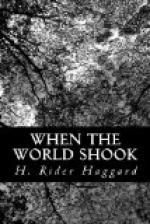And now came the terror. All of this enormous city was dead. Had it stood upon the moon it could not have been more dead. None paced its streets; none looked from its window-places. None trafficked in its markets, none worshipped in its temple. Swept, garnished, lighted, practically untouched by the hand of Time, here where no rains fell and no winds blew, it was yet a howling wilderness. For what wilderness is there to equal that which once has been the busy haunt of men? Let those who have stood among the buried cities of Central Asia, or of Anarajapura in Ceylon, or even amid the ruins of Salamis on the coast of Cyprus, answer the question. But here was something infinitely more awful. A huge human haunt in the bowels of the earth utterly devoid of human beings, and yet as perfect as on the day when these ceased to be.
“I do not care for underground localities,” remarked Bastin, his gruff voice echoing strangely in that terrible silence, “but it does seem a pity that all these fine buildings should be wasted. I suppose their inhabitants left them in search of fresh air.”
“Why did they leave them?” I asked of Yva.
“Because death took them,” she answered solemnly. “Even those who live a thousand years die at last, and if they have no children, with them dies the race.”
“Then were you the last of your people?” I asked.
“Inquire of my father,” she replied, and led the way through the massive arch of a great building.
It led into a walled courtyard in the centre of which was a plain cupola of marble with a gate of some pale metal that looked like platinum mixed with gold. This gate stood open. Within it was the statue of a woman beautifully executed in white marble and set in a niche of some black stone. The figure was draped as though to conceal the shape, and the face was stern and majestic rather than beautiful. The eyes of the statue were cunningly made of some enamel which gave them a strange and lifelike appearance. They stared upwards as though looking away from the earth and its concerns. The arms were outstretched. In the right hand was a cup of black marble, in the left a similar cup of white marble. From each of these cups trickled a thin stream of sparkling water, which two streams met and mingled at a distance of about three feet beneath the cups. Then they fell into a metal basin which, although it must have been quite a foot thick, was cut right through by their constant impact, and apparently vanished down some pipe beneath. Out of this metal basin Tommy, who gambolled into the place ahead of us, began to drink in a greedy and demonstrative fashion.
“The Life-water?” I said, looking at our guide.
She nodded and asked in her turn:
“What is the statue and what does it signify, Humphrey?”
I hesitated, but Bastin answered:
“Just a rather ugly woman who hid up her figure because it was bad. Probably she was a relation of the artist who wished to have her likeness done and sat for nothing.”




